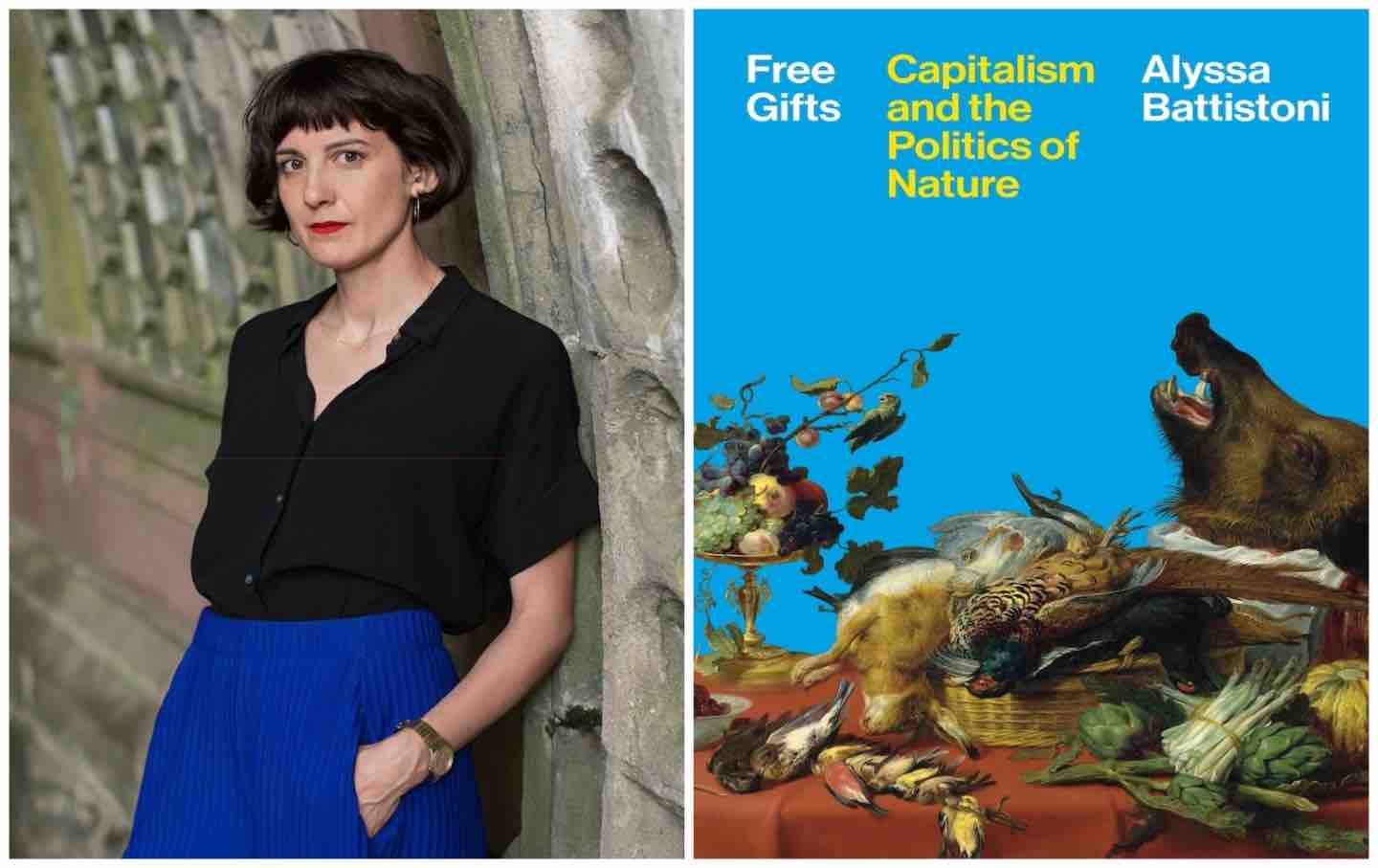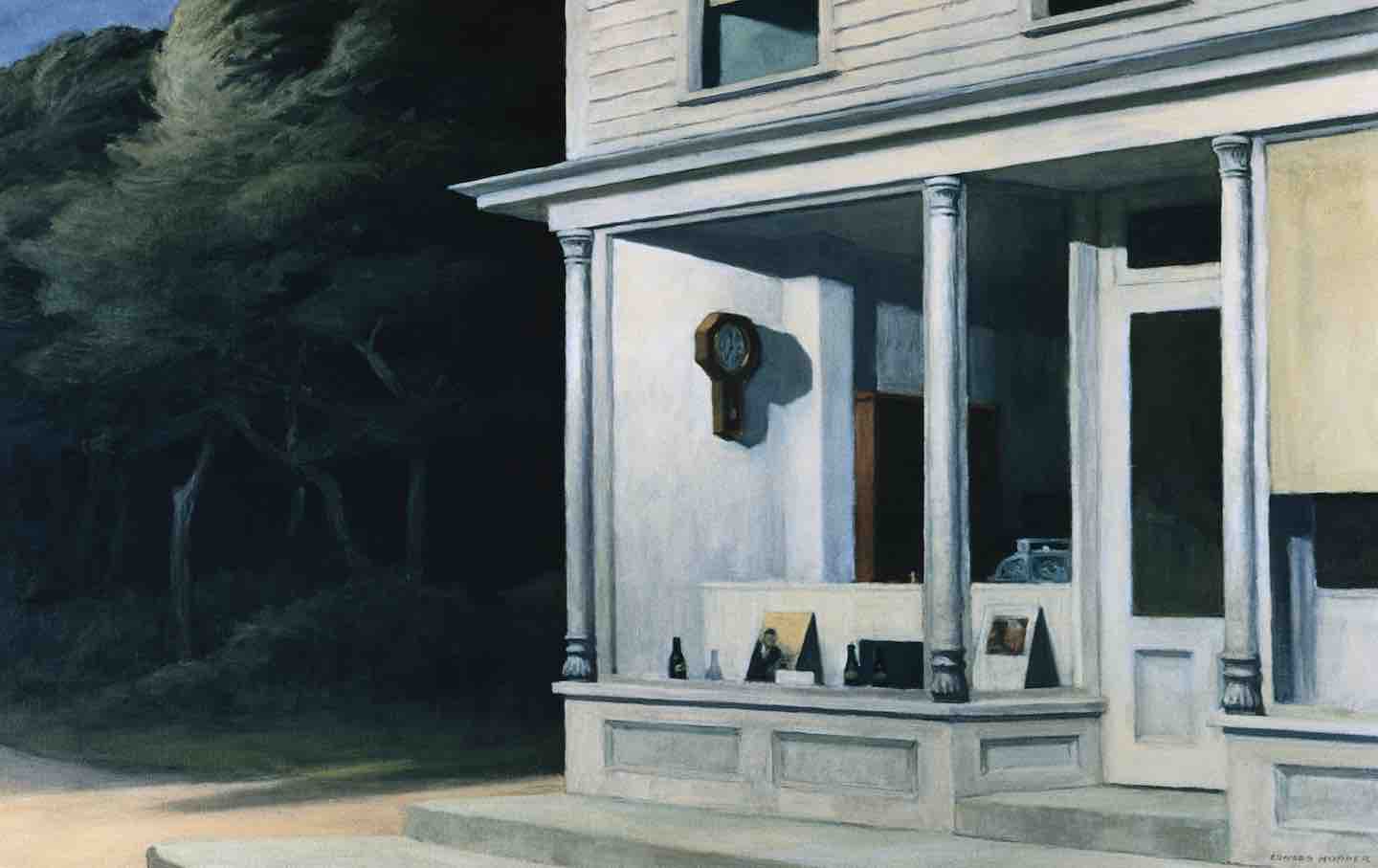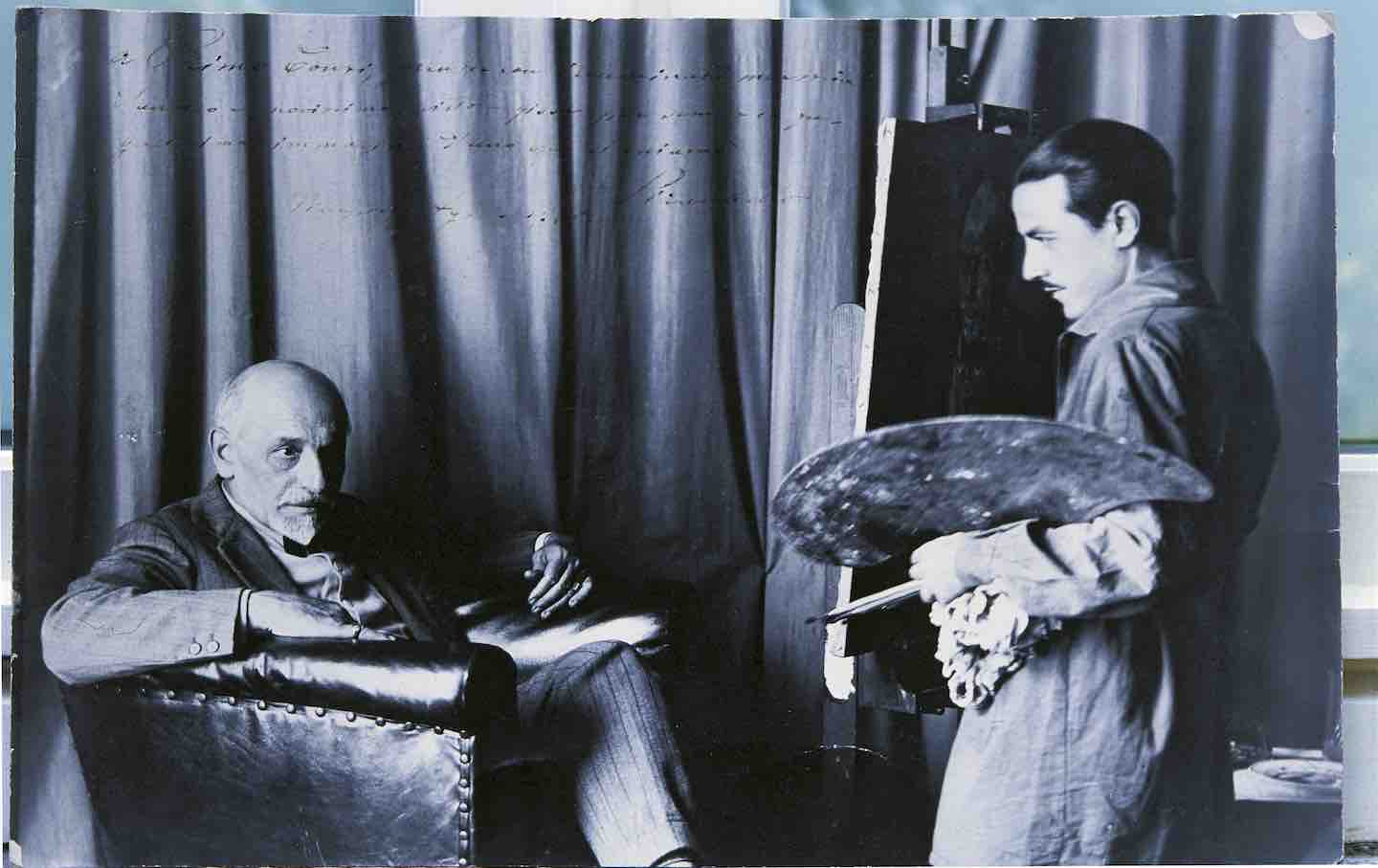The Uncanny Façades of May December
The Uncanny Façades of “May December”
Todd Haynes’s discomfiting and hypnotic suburban melodrama examines topics the director knows well: sex, taboo, and control.

Natalie Portman as Elizabeth Berry and Julianne Moore as Gracie Atherton-Yoo in May December.
(Photo by Francois Duhamel / Courtesy of Netflix)At the beginning of Todd Haynes’s uncanny new melodrama, May December, an actress named Elizabeth Berry (Natalie Portman) observes a beautiful couple, Gracie (Julianne Moore) and Joe (Charles Melton), cuddling on patio chairs outside their coastal manor home. Located on a barrier island 20 minutes from downtown Savannah, Ga., the family residence is an ideal spot to host a barbecue. There’s a velvety beachside view, a sprawling deck, a bedroom window with access to the roof, where gangly teenagers have assembled. The two are speaking to each other, but we can’t hear them from where Elizabeth is sitting; the camera slowly zooms in on their muted conversation, creating a sense of intrigue. Keeping with a long tradition in American drama about the dark underbelly of suburban life, the scene intimates that there is more to this quaint image of domesticity than meets the eye. Elizabeth is banking on it and so are we.
In the mid-1990s, Gracie, then in her 30s and married with three kids, was caught having an affair with Joe, a Korean American adolescent. He was only 13. In other Haynes films, like Carol and Far From Heaven, a housewife’s infidelity is a justified revolt, but here the couple’s forbidden love unsettles even the most compassionate viewer. How could a grown woman desire a pubescent boy? How could she claim to be in love with him? The film echoes the real-life case of Mary-Kay Letourneau, a tabloid sensation who, in 1997, pleaded guilty to raping a 12-year-old boy, whom she would later marry. Gracie, too, had been subjected to a very public trial and sentenced to prison, where she gave birth to the first of her three children fathered by Joe.
May December takes place more than 20 years later, leaving these salacious events up to memory and the imagination—Elizabeth’s, above all. A TV star angling for a serious role, Elizabeth is set to play Gracie in an independent movie about the couple’s notorious courtship. According to the actress, the film is meant to be “complex” and “human,” meaning nothing like the hokey made-for-TV movies that have already broached the subject. Gracie has positioned herself as a collaborator, inviting the younger woman to spend time with her as she flits around town, playing the part of normal suburban mom. Gracie attends flower arrangement classes; bakes pineapple turnover cakes that she sells to her friends and neighbors; goes shopping with her daughter for a graduation dress that no one will see—the dress goes under the ceremonial gown.
The trembling piano score by Marcelo Zarvos, a reorchestration of Michel Legrand’s music for The Go-Between (1971), gives the film the trappings of melodrama, its heightened atmosphere signaling a simmering crisis. Zarvos’s score drops with an operatic force in some of the most banal moments, such as one in which Gracie opens the fridge and announces the need for more hot dogs. It’s a funny bit, all the more for the severity of the music that seems to play off it ironically. Yet the ecstatic score is also key to the film’s treatment of surface appearances, making felt—rather than explaining—the unsettling friction between an apparently tranquil family routine and the neurosis that simmers beneath it. In calling attention to this disconnect, the music draws out the artificial—the performative—from what might otherwise seem natural.
In Haynes’s work, the demands of parenting can become a form of denial: Living in service to someone else means neglecting your own truth. Gracie finds cover, a raison d’être, in her single-minded devotion to a domestic ideal. Gracie is a helicopter parent overly eager to scrutinize her kids’ eating habits and waistlines, conveying her own insecurities through passive aggression. At the same time, her fixations seem particularly trivial because her college-bound kids are not only halfway out the door but also perceivably more well-adjusted than their parents. Who is Gracie without the homemaking activities that have given her life meaning? It’s no wonder that when one of her pineapple-cake clients calls and cancels all future orders, Gracie has a meltdown.
May December is Haynes’s fifth collaboration with Julianne Moore, as well as his return to the kind of expressive female-driven narrative for which he’s arguably most beloved. Working from a screenplay by Samy Burch that resonates to an uncanny degree with Haynes’s enduring thematic obsessions, the director spins another tale of repression and desire, performance and spectatorship—this time anchored in the humdrum aftermath of a true-crime spectacle. Haynes’s films understand how, in a world so quick to denounce, exploit, and criminalize desires that go against the norm, being perceived can induce fear and paranoia. Far from condoning the child abuse that exists in the rearview, May December threads a needle: finding room to empathize with its “criminal,” while crafting a character so subtly rotten that we gradually come to question that empathy. The film achieves this balancing act by centering the perspective of Elizabeth, a woman whose narcissism and hunger mirrors Gracie’s.
“Meaning is not in things but in between them,” wrote the philosopher Norman O. Brown. The aphorism appeared on a title card in Velvet Goldmine, and it broadly applies to Haynes’s body of work. For the director, identity is constructed as a process of recognition—seeing yourself in your mother or your favorite rock star. Elizabeth and Gracie, two seemingly unknowable women, are at their most transparent when they’re looking at each other—or, rather, looking at each other looking at themselves. Three of the film’s most powerful scenes involve the two women in front of a mirror, recalling Ingmar Bergman’s Persona, another film about masks and merged identities. The women’s subtly confrontational relationship is a façade of tensile grins and feminine camaraderie; game recognizes game, but this mutual recognition isn’t satisfying—it’s horrifying. Having both felt the heat of the public spotlight, their lives treated like curiosities, performance is a kind of protective armor for Gracie and Elizabeth—to despise the other for faking it means admitting you’re faking it, too.
Haynes fills the movie with shots of mirrors and windows, creating a destabilizing funhouse effect that undermines the story’s ostensible truth-seeking structure. In contrast to the glittering dreamscapes of Velvet Goldmine or the Douglas Sirk–like vibrancy of Far From Heaven, there is a glassiness to the visuals of May December, its muted pastels and West Elm furnishings captured by cinematographer Christopher Blauevelt in a way that accentuates their eerie vacancy. The film’s minimalism is a departure from Haynes’s usual penchant for lush decorative details, but the stripped-down approach also resonates with the film’s ghostly underpinnings.
Throughout May December, Elizabeth plays a kind of sleuth, interviewing people in Gracie’s orbit (like her former attorney and her ex-husband) to better inhabit her new role. But if Gracie’s “truth” proves to be beyond reach, Elizabeth puts forth a comparably elusive front. She is an actress who doesn’t know how to drop the act, rotating masks that convey her celebrity status—she exaggerates graciousness in front of fans; plays the artist-provocateur in a room of high-school students; wields her beauty like a femme fatale before hapless men. As cunning as Elizabeth may think she is, her relentless performing narrows her point of view. She sees in Joe only a brooding hunk, treating him not like a real person but like an object that fuels the racy fiction she’s built around the couple’s story. “It’s just what adults do,” she says to justify her blasé attitude after they have sex in her Airbnb, instilling their actions with a contrived inevitability. Funny that a woman so in command of her own sexuality—and her image as a sexual object—could be so blind to the emotional contours of a man for whom sex with one partner has defined the course of his life.
Save for his children, no one really perceives Joe despite his conspicuous state of arrested development. His manner of speaking is slow and hesitant. Like a timid teen, his eyes are downcast and his shoulders are stuck in a perpetual hunch. We see from the very beginning how Joe lives his life according to his wife’s rule. It’s in the disinfectant he knows to spray twice on her hands when they receive a piece of scatalogical hate mail; in the cologne he automatically applies when Gracie complains about his smoky scent. “What I want is for you to have showered before you get in [bed],” she says, practically expecting him to read her mind.
Gracie’s controlling nature is easily downplayed because her whims seem so slight—the figure of the housewife and her desires are often met with condescension, and Gracie, who speaks with a childlike lisp, plays into this infantilization. Wielding her fragility like a weapon, she expects her husband to respond with the loving sympathy and deference that such delicate behavior should elicit from the dominant partner. “Who was the boss back then?” she asks Joe rhetorically in a confrontation in the final act (Burch lifted the line from an interview with Letourneau). Does Gracie actually believe Joe seduced her when he was 13? Has Joe convinced himself that he was just as responsible as Gracie in what was obviously an abusive relationship? Are we viewers patronizing Joe, now an adult man, by attaching him to victimhood?
Joe raises monarch butterflies at home, which serves as a somewhat pat metaphor for the evolution that he undergoes in the film. Elizabeth may be milking him for juicy details when she asks about his life choices, yet this questioning—and the couple’s soon-to-be-empty nest—prompts long-suppressed self-reflection. The shock of Melton’s performance, his throbbing naturalism, is impossible to ignore in the context of a film otherwise distinguished by (and critical of) its indulgent theatricality. If the ladies know exactly what to say—how to pose and perform to get what they want—Joe is nothing but himself, trapped in the inchoate realm of his interiority. At first, he’s incapable of even articulating his feelings, much less wielding them for manipulative effect. When he does begin to open up—to his son after a few hits from a joint, to Gracie after he sleeps with Elizabeth—the man can’t help but cry as he ekes out a string of disjointed words. These moments cut through the film’s manicured shell, signaling a painful but liberatory catharsis—the kind that comes with finally mustering the courage to perceive yourself.
Disobey authoritarians, support The Nation
Over the past year you’ve read Nation writers like Elie Mystal, Kaveh Akbar, John Nichols, Joan Walsh, Bryce Covert, Dave Zirin, Jeet Heer, Michael T. Klare, Katha Pollitt, Amy Littlefield, Gregg Gonsalves, and Sasha Abramsky take on the Trump family’s corruption, set the record straight about Robert F. Kennedy Jr.’s catastrophic Make America Healthy Again movement, survey the fallout and human cost of the DOGE wrecking ball, anticipate the Supreme Court’s dangerous antidemocratic rulings, and amplify successful tactics of resistance on the streets and in Congress.
We publish these stories because when members of our communities are being abducted, household debt is climbing, and AI data centers are causing water and electricity shortages, we have a duty as journalists to do all we can to inform the public.
In 2026, our aim is to do more than ever before—but we need your support to make that happen.
Through December 31, a generous donor will match all donations up to $75,000. That means that your contribution will be doubled, dollar for dollar. If we hit the full match, we’ll be starting 2026 with $150,000 to invest in the stories that impact real people’s lives—the kinds of stories that billionaire-owned, corporate-backed outlets aren’t covering.
With your support, our team will publish major stories that the president and his allies won’t want you to read. We’ll cover the emerging military-tech industrial complex and matters of war, peace, and surveillance, as well as the affordability crisis, hunger, housing, healthcare, the environment, attacks on reproductive rights, and much more. At the same time, we’ll imagine alternatives to Trumpian rule and uplift efforts to create a better world, here and now.
While your gift has twice the impact, I’m asking you to support The Nation with a donation today. You’ll empower the journalists, editors, and fact-checkers best equipped to hold this authoritarian administration to account.
I hope you won’t miss this moment—donate to The Nation today.
Onward,
Katrina vanden Heuvel
Editor and publisher, The Nation
More from The Nation

The Best Albums of 2025 The Best Albums of 2025
From Mavis Staples to the Kronos Quartet—these are our music critic’s favorite works from this year.

Forrest Gander’s Desert Phenomenology Forrest Gander’s Desert Phenomenology
His poems bridge the gap between nature’s wild expanse and the private space of one’s imagination.

Capitalism’s Toxic Nature Capitalism’s Toxic Nature
A conversation with Alyssa Battistoni about the essential and contradictory nature of capitalism to the environment and her new book Free Gifts: Capitalism and the Politics of Nat...

Solvej Balle and the Tyranny of Time Solvej Balle and the Tyranny of Time
The Danish novelist’s septology, On the Calculation of Volume, asks what fiction can explore when you remove one of its key characteristics—the idea of time itself.

Muriel Spark’s Magnetic Pull Muriel Spark’s Magnetic Pull
What made the Scottish novelist’s antic novels so appealing?

Luigi Pirandello’s Broken Men Luigi Pirandello’s Broken Men
The Nobel Prize-winning writer was once seen as Italy’s great man of letters. Why was he forgotten?


